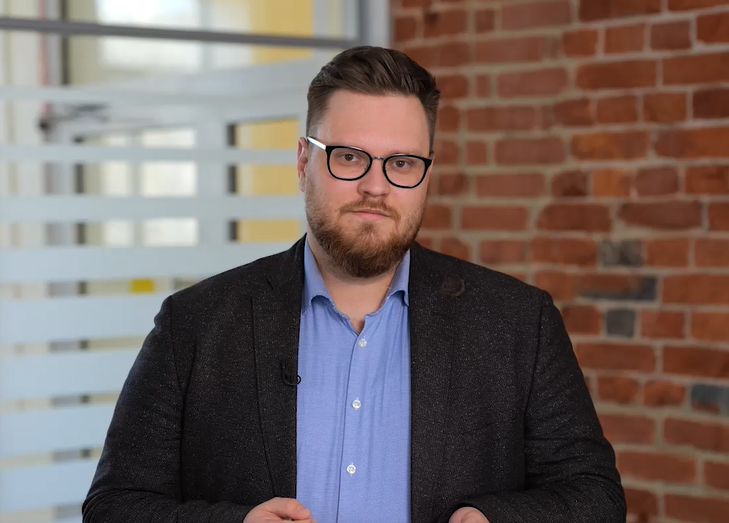"A Product Manager Makes the World Around Us More Comfortable"

In 2021, the new Master programme ‘Digital Product Management’ of HSE Graduate School of Business and Netology will hold its first intake. The educational track of the programme will combine fundamental knowledge and practice with real-world tasks from industry experts. Pavel Voloshchuk, the programme's academic supervisor, explains what a digital product is, what tasks a product manager solves, and what competencies students will develop in the course of their studies.
Who is a product manager?
You and I are surrounded by digital products. We use them all the time, they are all around us: in our smartphones, in transport management, in climate control. We work with them in the office, or when we ask the waiter for the bill, and so on. All these digital products are managed by someone. Such a person with a dedicated role is called a product manager in professional parlance.

On the market today, there is no single standard of who a product manager is, what competencies he should have and what he does. We conducted research before offering this programme to the market and saw two extremes. The first one is a person who has very strong legs, that is, he runs fast and drives everyone, goes to meetings where he defends the interests of his team and his product and communicates information. In other words, there are 'cogs' who perform very important functions, and there are those who just pass the motion on. He is the kind of 'cog' that conveys information.
And the second extreme: a product manager is a very high-level expert who understands all the nuances associated with a product. This includes identifying customer needs, quickly and cheaply testing product hypotheses, managing development, organising sales and marketing, working with investors, writing good sales texts, and a whole lot of other things about metrics, data, analytics, etc. And the product manager has to have those skills at a sufficient level to keep all the functions around the product communicating and working.
There are companies in the market where the product manager performs these functions. We would like to see the market move in this direction.
Our global goal is to bring to the market people who have all the necessary competencies and who are unique experts capable of working at a deep level with their product and creating value for users
About the project approach and the format
'Digital Product Management' will be fully held online, but the form of training is full-time. It turns out that our programme, like all full-time programmes, is classical, opening in September, with the necessary amount of examinations, etc. Nevertheless, a person will be able to study on it from another city or another country, and in the end, he or she will receive a full-time Master degree from the Higher School of Economics.
The Master programme will form all the competencies I have mentioned above. Plus, of course, soft skills: skills that allow you to manage yourself, interact effectively with others, work with stakeholders and in a team, and manage projects.
And most importantly, we don't just disperse these skills, from the basics of web programming to good copywriting, we build them into project work. Students come to us in September and immediately start making their first product. We teach them project management – they use these practices, we give them quick hypothesis testing, client research – they do it themselves right away. We go through everything with them in practice and several times. Because when there is a time lag between theory and practice, it creates a problem with the formation of competencies.
About the stages of product creation and the programme's disciplines
At entry, we will teach our students adaptation disciplines, e.g. programming for managers or management for programmers.
Then there are the basic functions without which you cannot make a good product, and this is what the structure of the programme will be based on. The first thing a product usually starts with is the formulation of hypotheses. So our first discipline is about how to research clients, generate hypotheses and test them quickly.
The second stage will be learning about project management (Waterfall and Agile). The trainees will have their first project workshop, where they will be divided into teams and work on creating the product in teams, managing the project according to one of the methodologies.
We will have different disciplines: Python, development management, marketing basics, product metrics, data visualisation, copywriting, programming without code, and many, many others.
The variability is expected to be small: only 3-4 disciplines will be left "off the board" for each student. This is because we conducted research before the programme launch, and we found out that it is important for our students to have the potential opportunity to attend all of the disciplines. The moment to make a choice is very painful for them, as they want to maximise the value that the programme provides. So we tried to make sure they didn't feel like they were missing out on a big piece of learning.
"Soft skills" will be the subject of a separate series of workshops with experts, which will last for two years of training. We have chosen them so that they are appropriate to the stage the students are at. Because when you first come to the programme, you must learn to understand more about yourself, to understand how you manage yourself, what emotions you have, how to live with them properly, what you are prone to, how you look at others. Then, when you start working in a team, it becomes important to learn how to give feedback, how to respond to it, how to build teamwork. When you finish your first product project (this will be the end of the second module), you need to know more about change management, working with stakeholders, because you have to sell this project.
About the teaching staff
Most of the teaching staff are practitioners working in business. There are only a few basic disciplines that relate to computer science, and you need them to lean on. Because, for example, it is difficult to teach the basics of programming if a student knows nothing about analytics and working with data. This expertise is traditionally strong at the university, and here we do not need to involve someone from the business. And all the other applied disciplines will be taught by practitioners.
I, the academic supervisor of the programme, did not work at the university myself until 2019: I was a consultant and worked for Sber. That is why we are also taking experts from the market into the teaching team. For example, Sergei Artyukhov is the cluster leader at SberWorks. Or Nikita Naumov, founder of the No-Code Academy, one of the leading providers on the market. We will also have, for example, Sergei Kalugin - one of the heads of the Coordination Centre of the Russian Government.
About the perfect applicant
It is good when the applicant is knowledgeable in a subject area that falls within one of the competencies I have listed. It is something that will make his path easier, it is an advantage in terms of ease in future studies and work.
But if he or she has done something completely different before, personal abilities come to the fore: the desire and ability to learn, the willingness to invest a lot of work. After all, often when people see that it is an online programme, they think it will be easier. But it is, once again, full-time in form - and the workload will be the same or even greater.
So I would say that the most important thing is good abilities and the desire to become a product manager, make cool products, manage them and make the world a more comfortable and better place
It sounds very pretentious, but it is true. Because what is the main point of a product manager's job? It is to make the world around us more comfortable. The world is moved forward by those who manage products. They create value for you and me.
The most important thing applicants need to know about the 'Digital Product Management' programme: we would like students in a safe environment to go through the same journey that all successful product managers have gone through. When they emerged, there was no higher education in this field on the market - they learned on their own through mistakes, negative experiences, unpleasant feedback from managers, colleagues and users, and it was usually a path of sweat, blood and tears.
We would like to give students an opportunity that we didn't have so that they could become successful, in-demand, high-paid experts without this trauma that we went through in our time. And I, as a representative of the industry, and the industry as a whole, would simply like to allow students to start their professional track in a more civilised way, to try everything in a safe environment, without risking their careers, their reputations or the comfort of their users.
